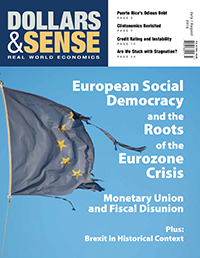Fighting Climate Change in Portlandia
Not only is failure not an option, those fighting to avert cataclysmic climate change have achieved important successes worthy of celebrating.
Capitalist Internationalism, Reactionary Nationalism, and Socialist Internationalism
The June referendum vote in the United Kingdom, narrowly in favor of departure from the European Union (or "Brexit," a portmanteau of "Britain" and "exit"), has thrown the future of the U.K. and its constituent nations into turmoil. The votes in England and Wales favored Brexit by modest margins. In contrast, the votes in Scotland and Northern Ireland favored remaining in the EU; in Scotland, overwhelmingly so. Already, the leaders of the Scottish government have called for a new referendum on independence from the U.K. (which, if victorious, would likely result in the country seeking to remain in the EU). It remains to be seen, meanwhile, whether Brexit is just the first in a domino tumble of exits from the union.

There has been a great deal of analysis, in the days since the vote, on the motives animating pro-Brexit voters. Many commentators have looked to underlying economic discontents, from the economic crisis of the 1970s and the death spiral of British industry and mining, to the age of neoliberal economic policy since the advent of Thatcher, to the global Great Recession and searing austerity under the current government. It is unmistakable, though, that the politics of Brexit, and the campaign led by the right-wing U.K. Independence Party (UKIP), are heavily laden with anti-immigrant sentiment. (In polls, over half of "leave" voters identified immigration into Britain as a "very important" issue, compared to just 14% of "remain" voters.) Right-wing, anti-immigrant leaders elsewhere in Europe, like Geert Wilders in the Netherlands and Marine Le Pen in France, have hailed Brexit as an example and called for referendums, in the near future, on their own countries' EU membership. Commentators are reading the rise of nationalism in Europe as a frightening echo of the events--leading up to the world wars--that shattered the last great age of capitalist globalization.
Just over a century ago, leaders and theorists of European Marxian socialism engaged in a pitched debate about the international integration of capital and the possibility that this would attenuate the conflicts between rival imperialist powers. The German Marxist theorist Karl Kautsky was a leading exponent of this theory of "ultra-imperialism." The Russian Marxists and Bolshevik leaders Lenin and Bukharin argued, against Kautsky, that the contradictions between rival imperialisms were too great to be reconciled anytime soon, whatever the far-off future might hold. They had a point, since the debate was taking place as the First World War raged. Ultimately, of course, the 20th century would see two World Wars erupt in the heart of Europe.
Kautsky saw ultra-imperialism as a possible result of capitalism's tendency toward international economic integration, along with the ruling classes' conscious desire to avoid future ruinous conflicts. He did not, however, openly advocate this as a system--in fact, he wrote "of course we must struggle against [ultra-imperialism] as energetically as we do against imperialism." The politics of post-World War II social democracy were a different story. Leading figures in Western Europe's mainstream social democratic parties embraced European political and economic integration as a way to avert a replay of the disasters of the first half of the 20th century. (Some were, surely, also motivated by the aim of strengthening Western Europe vis-a-vis the United States. And some had dreams for a united Europe that were genuinely social democratic--though not anti-capitalist.) In the most recent period, the "Third Way" figures who came to dominate the mainstream social democratic parties (like "New Labour" in the U.K.) signed on to the neoliberal project and to the selling of it as a triumph of globalism and cosmopolitanism over nationalism and parochialism. Now that this corporate-dominated and finance-dominated globalization has fallen into a disastrous crisis, a nationalist revanchism--embodied in nativist and "economic nationalist" movements--is capturing the backlash.
It is now a central challenge for the left, in Europe and around the world, to rescue internationalist politics from the disaster of capitalist globalization. The answer to surging nationalism is not to be found in the dream of a peaceful internationally integrated capitalism. There needs to be a radical left alternative that rejects nationalism and racism, that rejects the false equation of capitalist globalization with internationalism, and that fights for a new internationalism founded in workers' solidarity.